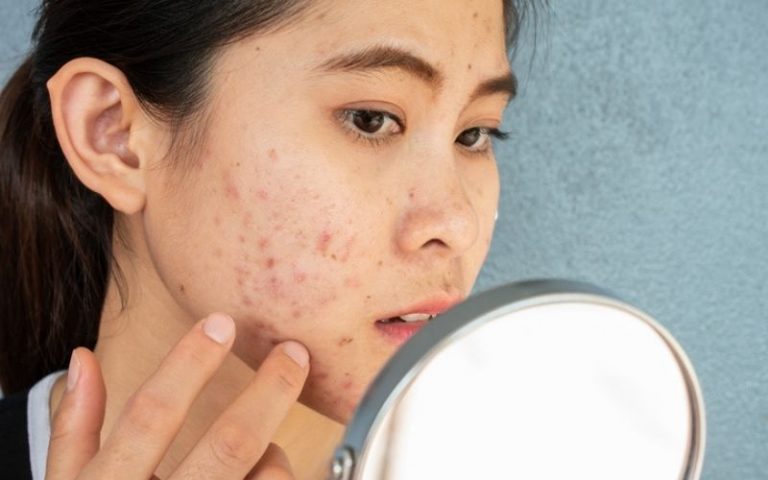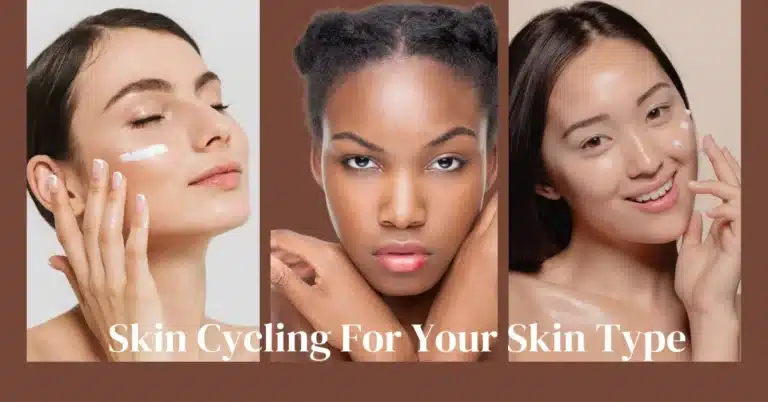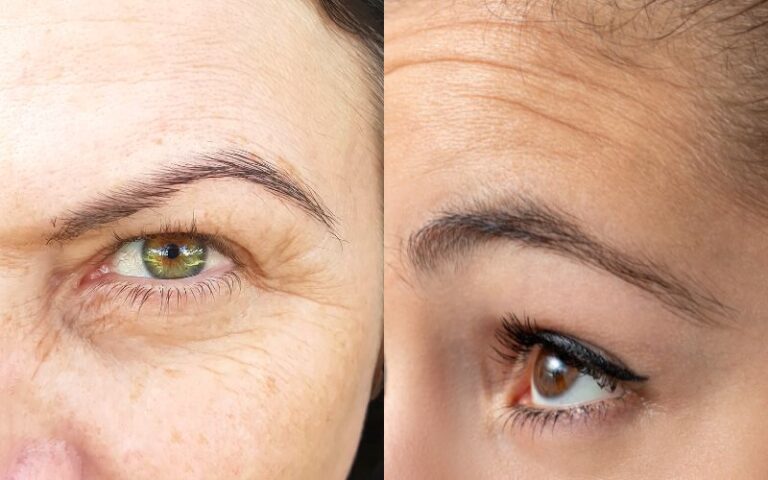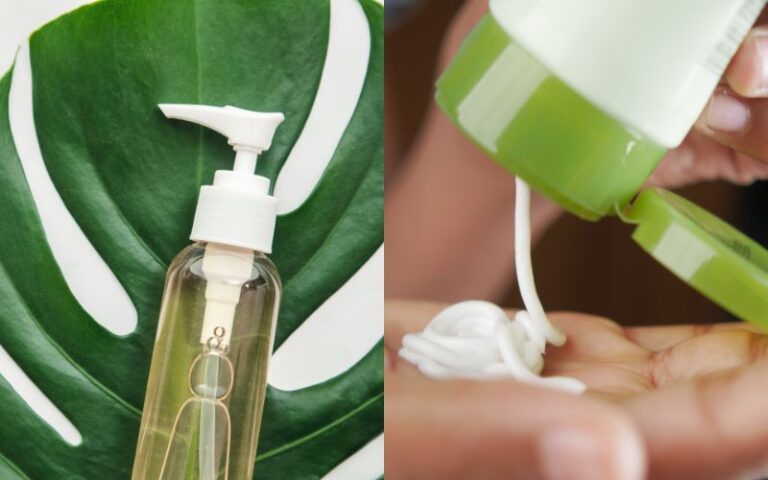Cosmetic Allergies And Skincare: Challenges And How To Tackle Them?
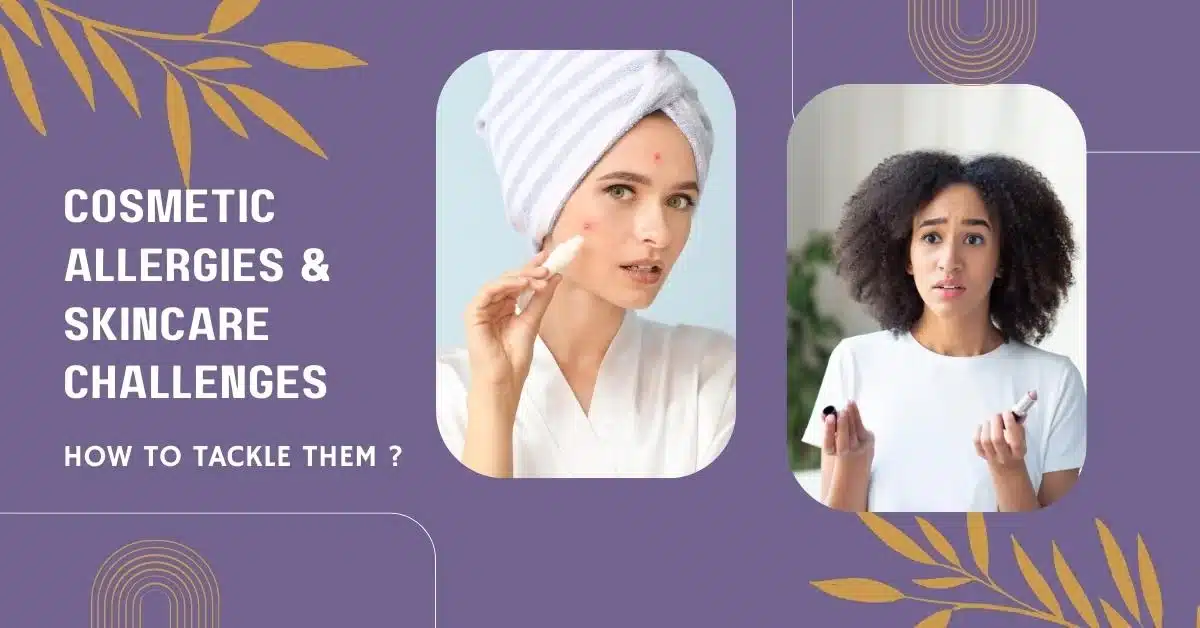
Are you someone who loves experimenting with different makeup looks or skincare products? While cosmetics and skincare routines can enhance our beauty and boost our confidence, it is crucial to be mindful of the potential hazards they might present. One of the key concerns is cosmetic allergies – adverse reactions that can occur when our skin reacts negatively to certain ingredients in cosmetic products.
Throughout this article, we will explore the various aspects of cosmetic allergies, including common symptoms, allergens to watch out for, prevention strategies, and steps to manage existing allergies effectively. By understanding cosmetic allergies comprehensively and their impact on skincare, you can embark on a skincare journey that promotes both beauty and well-being.
Now, let’s dive deeper into cosmetic allergies, where we will uncover the signs, causes, and solutions to ensure your skincare routine remains enjoyable and safe.
TABLE OF CONTENTS
- WHAT ARE COSMETIC ALLERGIES?
- COMMON CAUSES OF COSMETIC ALLERGIES
- SYMPTOMS OF COSMETIC ALLERGIES
- HOW TO IDENTIFY A COSMETIC ALLERGY
- PREVENTION AND MANAGEMENT OF COSMETIC ALLERGIES
- NATURAL AND HYPOALLERGENIC COSMETIC OPTIONS
- TIPS FOR CHOOSING COSMETIC PRODUCTS IF YOU HAVE ALLERGIES
- CONSULTING A DERMATOLOGIST FOR COSMETIC ALLERGIES
- COSMETIC ALLERGY MYTHS DEBUNKED
- TAKING CARE OF YOUR SKIN AND AVOIDING COSMETIC ALLERGIES
WHAT ARE COSMETIC ALLERGIES?
Cosmetic allergies refer to allergic reactions that occur when the skin comes into contact with certain elements commonly found in skincare and cosmetic products. These reactions are triggered by the body’s immune system, which mistakenly identifies harmless substances as threats. Consequently, the immune system releases substances that trigger inflammation, resulting in various skin symptoms.
It’s important to note that cosmetic allergies are different from irritations. While irritations can cause temporary discomfort and redness, allergies involve a more complex immune response that can lead to persistent symptoms such as itching, swelling, and even hives. It is essential to recognize the difference between irritation and allergy in order to determine the underlying cause of your skin’s reaction.
Cosmetic allergies can affect any part of the body that comes in contact with the product, including the face, eyes, lips, and even the scalp. It’s not uncommon for individuals to develop allergies to multiple cosmetic ingredients, making it challenging to find products that are safe to use. However, with the right knowledge and guidance, you can effectively manage and prevent cosmetic allergies.
COMMON CAUSES OF COSMETIC ALLERGIES
Cosmetic allergies can be caused by a wide range of ingredients, but some are more likely to trigger reactions than others. Fragrances, for example, are one of the leading causes of cosmetic allergies. Fragrance ingredients, including both natural and synthetic compounds, can cause skin sensitization and allergic reactions in susceptible individuals. Common fragrance allergens include limonene, linalool, and geraniol.
Preservatives are another common culprit when it comes to cosmetic allergies. These ingredients are essential for preventing the growth of harmful bacteria and extending the shelf life of cosmetic products. However, some preservatives, such as formaldehyde and parabens, have been associated with skin allergies and sensitivities. It’s important to note that preservatives are necessary to ensure the safety of cosmetic products, but some individuals may need to avoid certain types to prevent allergic reactions.
Other common causes of cosmetic allergies include dyes, metals (such as nickel), and certain herbal extracts. Dyes are often used to add color to cosmetic products, but some individuals may develop allergic reactions to these additives. Metals, especially nickel, are commonly found in jewelry and can cause allergic reactions when they come into contact with the skin. Herbal extracts, although natural, can also cause reactions in individuals with sensitive skin or specific allergies to certain plants.
SYMPTOMS OF COSMETIC ALLERGIES
The symptoms of cosmetic allergies can differ based on the individual and the intensity of the allergic reaction. Mild symptoms may include redness, itching, and a slight rash. In more severe cases, individuals may experience swelling, blistering, and even hives. Some individuals may also develop contact dermatitis, which can cause dry, scaly, and cracked skin.
Common symptoms of cosmetic allergies include:
- Skin Irritation and Rash: One of the most common signs of a cosmetic allergy is the development of a skin rash or irritation. It may appear as redness, itching, or small bumps on the affected area. This reaction typically occurs shortly after applying the cosmetic product.
- Swelling and Inflammation: Allergic reactions can also cause swelling in the areas where the makeup is applied. This can be particularly prominent around the eyes, lips, or cheeks. Inflammation may accompany the swelling, making the affected area feel warm and tender.
- Watery or Itchy Eyes: Eye makeup, such as mascara or eyeshadow, can lead to allergic reactions in the eye area. If you experience excessive tearing, itchiness, or redness in your eyes after applying eye cosmetics, it could be an indication of an allergic response.
- Dry, Chapped Lips: Some individuals may develop an allergic reaction to lip products like lipsticks or lip plumpers. The symptoms often include dryness, chapping, or flaking of the lips. In severe cases, the lips may become swollen or blistered.
Pay close attention to any changes in your skin after using a new cosmetic product. If you notice persistent symptoms that worsen with continued use of the product, it’s likely that you are experiencing an allergic reaction. Keep in mind that symptoms may not appear immediately after using the product but can develop over time with repeated exposure.
If you notice these symptoms after using a particular product, discontinue its use and consult a dermatologist for proper diagnosis and treatment. Self-diagnosis can be challenging, as many factors can contribute to skin reactions. A dermatologist can perform tests, such as patch testing, to identify the specific allergens causing your reactions.
HOW TO IDENTIFY A COSMETIC ALLERGY
Identifying a cosmetic allergy can be a process of trial and error. If you suspect that a specific product is causing your allergic reactions, it’s important to eliminate it from your routine and observe any changes in your skin. If the symptoms disappear after discontinuing use, it’s likely that the product was the culprit.
To pinpoint the exact ingredient causing the allergy, you may need to undergo patch testing. Patch testing involves applying small amounts of various allergens to your skin, usually on your back, and observing any reactions over a period of several days. This can help identify specific allergens and guide you in avoiding them in the future.
It’s worth noting that some individuals may have multiple allergies or sensitivities, making it essential to carefully read product labels and avoid known allergens. Keeping a journal of your reactions can also help identify patterns and potential triggers.
CROSS-REACTIVITY AND ALLERGENIC INGREDIENTS
Cross-reactivity is another important aspect to consider when dealing with cosmetic allergies. This phenomenon occurs when an individual is allergic to a particular substance and exhibits a similar allergic reaction to a related substance. For example, if someone is allergic to a specific fragrance, they may also react to other fragrances with similar chemical structures.
To avoid cross-reactivity, it is advisable to consult a dermatologist or allergist who can conduct patch testing to identify specific allergens. This testing involves applying small amounts of different substances to the skin and observing any reactions that occur over a period of time.
PREVENTION AND MANAGEMENT OF COSMETIC ALLERGIES
Preventing and managing cosmetic allergies requires a proactive approach to skincare. Here are some tips to help you minimize the risk of allergic reactions:
1. Read Product Labels
It is always advisable to review the list of ingredients before purchasing a cosmetic product. Seek out products that bear the labels “hypoallergenic” or “fragrance-free.” Avoid products that contain known allergens or irritants, such as fragrances, preservatives, and dyes.
2. Perform Patch Tests
If you’re unsure about a new product, perform a patch test before applying it to your entire face or body. Apply a small amount of the product to a small area of your skin, such as the inside of your wrist, and observe for any reactions over 24-48 hours.
3. Avoid Cross-Contamination
Use separate brushes, applicators, and tools for each cosmetic product to prevent cross-contamination. Wash your brushes regularly and avoid sharing makeup with others.
4. Opt For Natural And Hypoallergenic Products
Seek out products that are formulated with natural/organic ingredients and are specifically designed for sensitive skin. Hypoallergenic products are less likely to cause allergic reactions as they are formulated without common irritants.
5. Moisturize Regularly
Keeping your skin well-moisturized can help strengthen its natural barrier and reduce the risk of allergic reactions. Choose a gentle, hypoallergenic moisturizer that suits your skin type.
6. Avoid Excessive Exfoliation
Over-exfoliation can disrupt your skin’s natural barrier and increase the risk of allergic reactions. Limit exfoliation to once or twice a week using gentle products.
By following these preventive measures and taking a proactive approach to your skincare routine, you can significantly reduce the risk of cosmetic allergies and enjoy healthier, happier skin.
NATURAL AND HYPOALLERGENIC COSMETIC OPTIONS
If you have a history of cosmetic allergies or sensitive skin, opting for natural and hypoallergenic cosmetic products can be a game-changer. These products are specifically designed to minimize the likelihood of allergic reactions and are free from common irritants and allergens.
Natural cosmetic products are made from ingredients derived from nature, such as plant extracts, essential oils, and minerals. These products often have fewer additives and chemicals, making them gentler on the skin. However, it’s important to note that natural ingredients can still cause allergic reactions in some individuals, so it’s essential to perform patch tests and read product labels carefully.
Hypoallergenic cosmetic products, on the other hand, are formulated with the intention of minimizing the risk of allergic reactions. These products are typically fragrance-free, free from common irritants, and undergo rigorous testing to ensure their safety for sensitive skin. Opting for hypoallergenic products can significantly reduce the risk of cosmetic allergies and provide you with peace of mind when it comes to your skincare routine.
TIPS FOR CHOOSING COSMETIC PRODUCTS IF YOU HAVE ALLERGIES
Choosing the right cosmetic products when you have allergies can be overwhelming, but it doesn’t have to be. Here are some tips to help you navigate the world of cosmetics and find products that suit your needs:
- It is always advisable to review the list of ingredients on the product before making a purchase. Seek out products that bear the labels “hypoallergenic” or “fragrance-free.” Avoid products that contain known allergens or irritants.
- Before using a new product on your face or body, perform a patch test on a small area of your skin. Doing so will assist you in recognizing any possible allergic reactions before applying the product to your entire face or body.
- Look for products with minimal ingredients, as this reduces the risk of potential allergens. The shorter the ingredient list, the better.
- If you have known allergies to certain ingredients, such as fragrances or preservatives, make sure to avoid products that contain these allergens. Look for alternative options that are free from these ingredients.
- If you’re unsure about which products to use, consider consulting a dermatologist who specializes in cosmetic allergies. They can offer tailored suggestions according to your individual requirements and allergies.
Remember, finding the right cosmetic products may require some trial and error. It’s important to be patient and persistent in your search for products that work for you.
CONSULTING A DERMATOLOGIST FOR COSMETIC ALLERGIES
If you suspect that you have cosmetic allergies, it’s important to consult a dermatologist for proper diagnosis and treatment. A dermatologist specializes in skin conditions and can help identify the specific allergens causing your reactions.
During your consultation, the dermatologist may perform patch testing to identify the allergens that trigger your reactions. This involves applying small amounts of various allergens to your skin and monitoring for any reactions over a period of several days. Patch testing can help guide you in avoiding specific allergens in the future and provide recommendations for suitable skincare products.
In addition to patch testing, a dermatologist can also provide guidance on managing and preventing cosmetic allergies. They may recommend specific skincare products, prescribe topical medications for symptom relief, or offer advice on lifestyle changes that can cut down the risk of allergic reactions.
Remember, self-diagnosis can be challenging, and it’s always best to seek professional advice when it comes to your skin’s health. Consulting a dermatologist will ensure that you receive the appropriate care and guidance for your specific needs.
COSMETIC ALLERGY MYTHS DEBUNKED
When it comes to cosmetic allergies, there are several myths and misconceptions that can make it difficult to navigate the world of skincare. Let’s debunk some of these common myths:
Myth #1: Hypoallergenic products are 100% allergy-proof.
Fact: While hypoallergenic products are formulated to minimize the risk of allergic reactions, they are not guaranteed to be allergy-proof. Some individuals may still experience reactions to hypoallergenic products, as everyone’s skin is unique.
Myth #2: Natural products are always safe for sensitive skin.
Fact: While natural products can be gentler on the skin, they can still cause allergic reactions in some individuals. It’s important to perform patch tests and read product labels carefully, even when using natural products.
Myth #3: Once you develop a cosmetic allergy, you will always be allergic to that ingredient.
Fact: Allergies can change over time, and it’s possible for individuals to outgrow certain allergies or develop new allergies. It’s important to regularly reassess your skincare routine and consult a dermatologist if you suspect any changes in your skin’s reactions.
Myth #4: Allergic reactions to cosmetics are always immediate.
Fact: Allergic reactions can occur immediately after using a product, but they can also develop over time with repeated exposure. It’s important to pay attention to any changes in your skin and consult a dermatologist if you suspect an allergic reaction.
By debunking these myths, we can better understand the complexities of cosmetic allergies and make informed decisions when it comes to our skincare routine.
TAKING CARE OF YOUR SKIN AND AVOIDING COSMETIC ALLERGIES
Cosmetic allergies can be frustrating and challenging to deal with, but with the right knowledge and guidance, you can effectively manage and prevent allergic reactions. By understanding the common causes of cosmetic allergies, identifying the symptoms, and taking preventive measures, you can minimize the risk of reactions and enjoy healthier, happier skin.
When choosing cosmetic products, read product labels, perform patch tests, and opt for natural and hypoallergenic options whenever possible. If you suspect that you have cosmetic allergies, consult a dermatologist for proper diagnosis and personalized recommendations.
Remember, everyone’s skin is unique, and what works for one person may not work for another. Be patient, persistent, and proactive in your skincare journey, and together, we can navigate the world of cosmetics with confidence and achieve healthy, radiant skin.
FAQs
Q: Can cosmetic allergies develop over time?
A: Yes, cosmetic allergies can develop over time, even if you have previously used a product without any issues. Allergies can develop due to repeated exposure to allergenic substances or changes in the body’s immune response. It is important to remain vigilant and observe any new symptoms or reactions when using skincare or cosmetic products.
Q: Are natural skincare products less likely to cause allergies?
A: Natural skincare products can be a suitable option for individuals with cosmetic allergies, as they often contain fewer synthetic chemicals. However, it is important to remember that natural does not always mean hypoallergenic. Some natural ingredients can still cause allergies in certain individuals. Patch testing and reading product labels are crucial, regardless of whether a product is natural or not.
Q: What should I do if I have a severe allergic reaction to a cosmetic product?
A: If you experience a severe allergic reaction to a cosmetic product, it is important to seek immediate medical attention. Get in touch with your healthcare provider or visit an emergency room for prompt evaluation and treatment. Severe allergic reactions can lead to anaphylaxis, a life-threatening condition that requires immediate medical intervention.
Q: Can cosmetic allergies be prevented?
A: While it is not always possible to prevent cosmetic allergies entirely, there are steps you can take to minimize the risk. These include patch-testing new products, using hypoallergenic formulations, avoiding known allergens, and seeking professional advice when needed. By adopting a proactive approach and being aware of potential triggers, you can reduce the likelihood of experiencing allergic reactions.
Q: Are there any specific ingredients to avoid for sensitive skin?
A: Individuals with sensitive skin should be cautious when using skincare and cosmetic products. Some common ingredients to avoid or minimize exposure include fragrances, preservatives (such as parabens), artificial dyes, and certain chemicals like formaldehyde-releasing agents. Reading product labels and opting for hypoallergenic formulations can help individuals with sensitive skin make informed choices.
Q: How long does it take for an allergic reaction to subside?
A: The duration of an allergic reaction can differ based on the individual and the intensity of the reaction. Mild reactions may subside within a few hours or days, while more severe reactions may take longer to resolve. It is important to discontinue the use of the allergenic product and seek appropriate medical advice for proper diagnosis and treatment.
Q: Can I still wear makeup if I have cosmetic allergies?
A: Yes, individuals with cosmetic allergies can still wear makeup by choosing hypoallergenic or sensitive skin-friendly products. It is crucial to identify the specific allergens causing the reactions and avoid products that contain them.
References
https://www.fda.gov/cosmetics/cosmetic-ingredients/allergens-cosmetics

